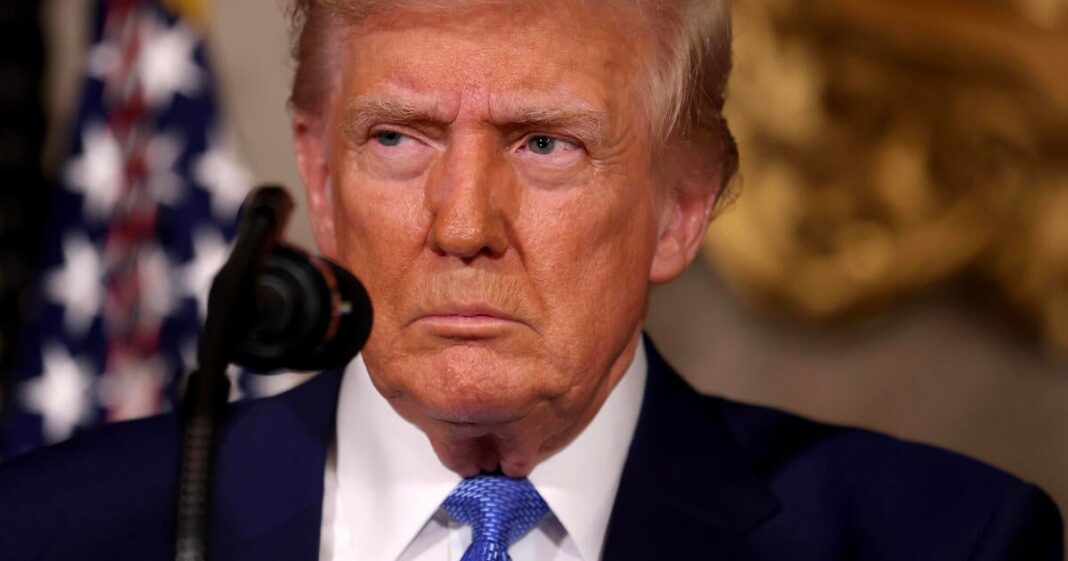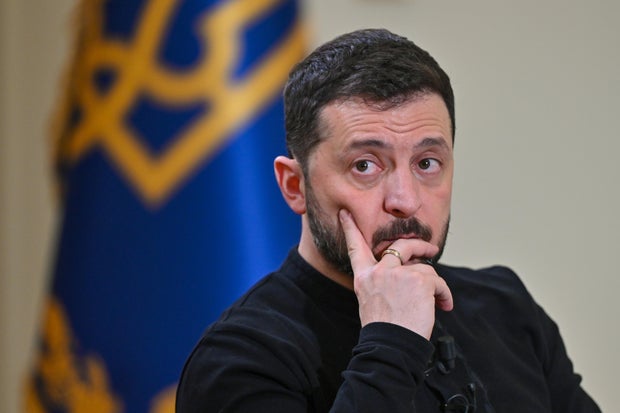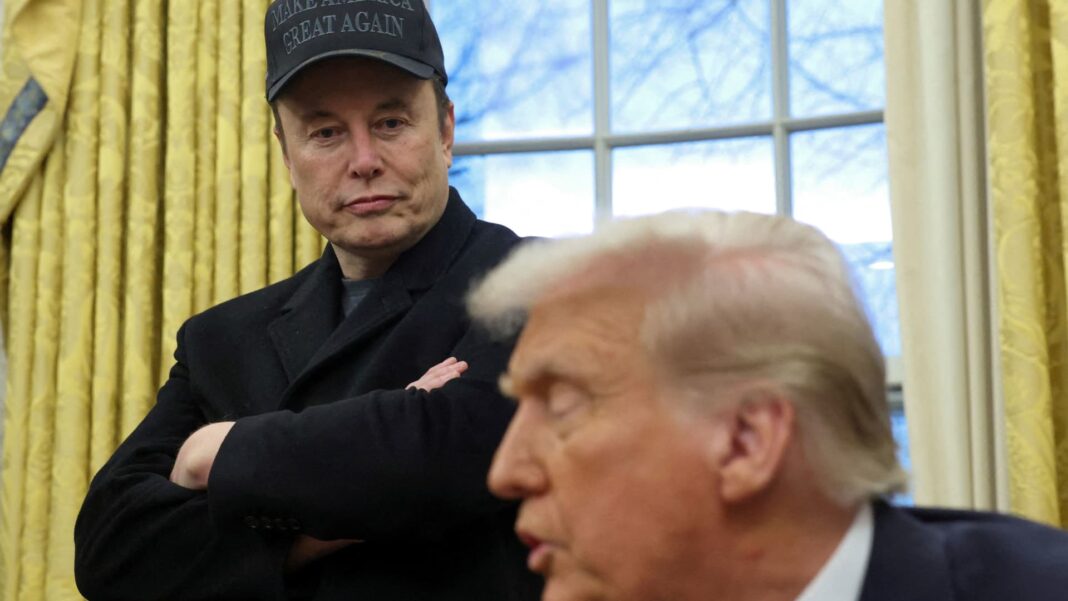President Trump, speaking Tuesday afternoon from his home in Florida, appeared to shift three years — if not many decades — of U.S. foreign policy almost 180 degrees, issuing remarks that made his administration sound aligned more with Russian President Vladimir Putin than America’s European allies of the last eight decades.
In rhetoric similar to claims Putin has used himself to justify his three-year war on Ukraine, Mr. Trump seemed to blame President Volodymyr Zelenskyy for Russia’s full-scale invasion after the Ukrainian leader took issue with being left out of initial conversations between the White House and Moscow, which began Tuesday in Saudi Arabia.
“I think I have the power to end this war, and I think it’s going very well. Today I heard, ‘Oh, well, we weren’t invited.’ Well, you’ve been there for three years. You should have ended it three years — you should have never started it,” Mr. Trump chided Zelenskyy. “You could have made a deal. I could have made a deal for Ukraine that would have given them almost all of the land. Everything, almost all of the land. And no people would have been killed and no city would have been demolished, and not one dome would have been knocked down. But they chose not to do it that way.”
Joe Raedle/Getty
“This is, frankly, what Vladimir Putin would have said — that none of this needed to happen, when in fact, it happened because he wanted it to happen,” Ravi Agrawal, the editor in chief of Foreign Policy magazine, told CBS News’ Major Garrett after hearing Mr. Trump’s remarks.
Zelenskyy reacted Wednesday, saying Mr. Trump appeared to be operating in a “disinformation space” fostered by Russia.
Putin, who first sent forces into Ukraine in 2014 and seized control of its Crimean Peninsula in a unilateral annexation never recognized by the U.S. or most of the world, has claimed he was forced to launch his full-scale attack on the neighboring nation due to a threat posed by the U.S.-led NATO alliance spreading its influence eastward toward Russia’s border.
The U.S. and its European NATO allies have always dismissed that excuse, insisting that Putin’s real intention ahead of the February 2022 full-scale invasion was always to seize more of Ukraine’s sovereign territory and delegitimize Zelenskyy’s pro-Western government.
“NATO consists of 32 countries and NATO’s position is that it [war in Ukraine] was unprovoked,” Adm. Stuart B. Munsch, the commander of U.S. Naval Forces for Europe and Africa, said Wednesday in Romania when asked about Mr. Trump’s remarks. The American commander — one of the U.S. Navy’s longest-serving active duty officers — is in Romania for a NATO military exercise aimed at preparing the alliance for any further Russian aggression on Europe’s far eastern flank.
Mr. Trump has made fiery rhetoric, and sometimes a loose adherence to fact, a hallmark of his negotiating tactics with foreign powers — including a baseless claim from his Mar-a-Lago mansion on Tuesday that Zelenskyy’s approval rating had dipped to 4%, when domestic polling in Ukraine shows it over 50%. That lines up with Kremlin propaganda, along with a call for Ukraine to hold new elections and a suggestion it should have done so already, despite the country’s constitution making a vote impossible under the current state of emergency sparked by Russia’s invasion.
Mr. Trump’s remarkable espousal of Russian rhetoric has fueled rising concern in Europe that the U.S. could be shifting the enormous weight of its geopolitical and security influence away from the deep-rooted democracies of the West, toward the autocratic rulers of the ideologically conservative east, and especially Putin.
The Russian leader’s longtime confidant, Foreign Minister Sergei Lavrov, acknowledged the shift Wednesday, lauding Mr. Trump and saying his “remarks on NATO being the main reason for the conflict in Ukraine are a signal that he understands our position.”
“I assume the United States, as discussed yesterday, intends to remove obstacles that are in the path of promising projects. We have begun to move away from the edge of the abyss where Biden’s administration led our relationship,” the veteran Russian diplomat said.
Zelenskyy has softened his stance in recent months, seemingly accepting that he may have to cede some of his country’s Russian-occupied territory in an eventual peace deal, but he’s made it clear that Ukraine must be involved in the negotiations for a ceasefire agreement, and that his country will need security guarantees from the U.S. and the West to protect it from any future Russian attack.
“We are seeing a lot of disinformation and that is coming from Russia,” Zelenskyy said Wednesday. “Unfortunately, President Trump, with all due respect… is living in this disinformation space.”
Mert Gokhankoc/dia images/Getty
The Ukrainian leader said he wanted to end the war “this year,” but he admonished the Trump administration for helping Russia’s autocratic regime to “break out” of the isolation it brought upon itself — in the form of sanctions and cut-off diplomacy — by launching the unprovoked attack on his country.
In a post on his own Truth social media platform, President Trump doubled down on his criticism of Zelenskyy later Wednesday, accusing him doing “a terrible job” and of “playing” the Biden administration to convince the U.S. to spend hundreds of billions of dollars “to go into a War that couldn’t be won.”
Repeating the Kremlin’s misleading refrain that Zelenskyy “refuses to have Elections,” Mr. Trump went as far as calling Zelenskyy a “dictator,” warning the Ukrainian leader that he, “better move fast or he is not going to have a Country left.”
“In the meantime, we are successfully negotiating an end to the War with Russia, something all admit only ‘TRUMP,’ and the Trump Administration, can do,” argued Mr. Trump.
It was unclear how hard Mr. Trump’s special envoy Keith Kellogg, who arrived in Kyiv Wednesday to “sit and listen” to Zelenskyy’s administration after the Ukrainians were left out of the initial dialogue with the Kremlin, would push the American president’s viewpoint that Ukraine could or should have prevented or stopped the war foisted upon it by its far larger, far better armed, autocratically-ruled neighbor.
Upon arriving, Kellogg, a retired three-star general, said it was nice to be visiting Kyiv “just a few days before the third anniversary of Russia’s invasion of Ukraine,” seemingly acknowledging which side had initiated the war.
Kellogg called his visit “a chance to have some good, substantial talks,” but what Ukraine will want is a clear indication that the world’s biggest military power will somehow protect it from future Russian aggression. Zelenskyy has long said that could come in the form of either NATO membership for his country or NATO forces deployed to enforce a ceasefire.
After U.S. Secretary of State Marco Rubio led the White House delegation’s bilateral talks with Lavrov in Saudia Arabia on Tuesday, the Russian foreign minister said point-blank that the Kremlin wouldn’t accept either of those things. Russia has already ruled out any exchange of occupied territory with Ukraine, and it’s unclear what concessions the Trump administration could try to win from Russia for a peace deal.
“We understand the need for security guarantees,” Kellogg told Ukrainian public broadcaster Suspilne Novyny after arriving in Kyiv on Wednesday. “It’s very clear to us the importance of the sovereignty of this nation and the independence of this nation as well… Part of my mission is to sit and listen.”
He said he would share what he learned on his trip to Kyiv with Mr. Trump and Rubio to “ensure that we get this one right.”
A Kremlin spokesperson has said Putin and President Trump could meet in-person as early as this month, even as the war in Ukraine rages on.
Haley Ott
contributed to this report.



